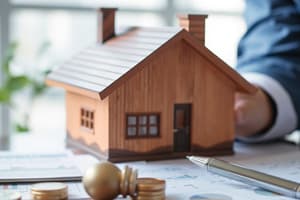Podcast
Questions and Answers
What is the primary purpose of property valuation?
What is the primary purpose of property valuation?
- To assess property maintenance needs
- To determine property market trends
- To calculate taxes owed
- To develop an opinion of property value (correct)
Which of the following is NOT a category of occasions for property valuation?
Which of the following is NOT a category of occasions for property valuation?
- Market transactions
- Rental assessments (correct)
- Legal transactions
- Mortgages
What distinguishes Real Estate from Real Property?
What distinguishes Real Estate from Real Property?
- Real Property includes both land and any structures on it (correct)
- Real Estate is concerned with financial transactions only
- Real Property is a type of personal property
- Real Estate refers to land ownership only
Which of the following best describes the valuation process?
Which of the following best describes the valuation process?
Which factor is NOT considered in the valuation process?
Which factor is NOT considered in the valuation process?
For what legal reason might a valuation be required?
For what legal reason might a valuation be required?
Which of the following is a common misconception about valuation?
Which of the following is a common misconception about valuation?
What is the relationship between price, cost, and value in property valuation?
What is the relationship between price, cost, and value in property valuation?
What constitutes the scientific part of valuation?
What constitutes the scientific part of valuation?
Which of the following is included in the legal definition of real estate?
Which of the following is included in the legal definition of real estate?
What differentiates real estate from real property?
What differentiates real estate from real property?
Which of the following is NOT considered part of real estate?
Which of the following is NOT considered part of real estate?
What is a key aspect of the artistic side of valuation?
What is a key aspect of the artistic side of valuation?
Which is included in the definition of real estate attachments?
Which is included in the definition of real estate attachments?
Which best describes real estate in terms of its physical nature?
Which best describes real estate in terms of its physical nature?
What does real property encompass beyond just physical land?
What does real property encompass beyond just physical land?
What is the primary focus of most property valuation assignments?
What is the primary focus of most property valuation assignments?
Which of the following factors is NOT included in the definition of market value?
Which of the following factors is NOT included in the definition of market value?
What does the term 'arm’s-length transaction' imply in the context of market value?
What does the term 'arm’s-length transaction' imply in the context of market value?
Which aspect of the market value definition emphasizes the importance of buyer and seller motivation?
Which aspect of the market value definition emphasizes the importance of buyer and seller motivation?
What is assumed regarding the price in a fair market sale?
What is assumed regarding the price in a fair market sale?
According to the International Valuation Standards Committee, what is essential for market value estimation?
According to the International Valuation Standards Committee, what is essential for market value estimation?
What does the term 'reasonable time' refer to in the context of market value?
What does the term 'reasonable time' refer to in the context of market value?
What does 'undue stimulus' refer to in market value transactions?
What does 'undue stimulus' refer to in market value transactions?
What defines an arms-length transaction?
What defines an arms-length transaction?
Which of the following best describes use value?
Which of the following best describes use value?
How does investment value differ from market value?
How does investment value differ from market value?
What does going concern value encompass?
What does going concern value encompass?
What is the primary purpose of assessed value?
What is the primary purpose of assessed value?
How is assessed value typically calculated?
How is assessed value typically calculated?
What is required to determine an opinion of investment value?
What is required to determine an opinion of investment value?
Which of the following properties would likely have a defined use value?
Which of the following properties would likely have a defined use value?
What defines a special value in relation to an asset?
What defines a special value in relation to an asset?
What is synergistic value?
What is synergistic value?
Which factor is NOT one of the four interdependent factors that create property value?
Which factor is NOT one of the four interdependent factors that create property value?
How does scarcity affect the value of a commodity?
How does scarcity affect the value of a commodity?
What does desire refer to in the context of property value?
What does desire refer to in the context of property value?
Which element is part of effective purchasing power?
Which element is part of effective purchasing power?
Which of the following best describes the principle of supply and demand?
Which of the following best describes the principle of supply and demand?
What aspect of utility can significantly influence property value?
What aspect of utility can significantly influence property value?
What should be expected regarding the precision of a valuation?
What should be expected regarding the precision of a valuation?
Why is it unrealistic to expect absolute certainty in property valuation?
Why is it unrealistic to expect absolute certainty in property valuation?
What does market value depend on?
What does market value depend on?
In what way does an appraiser conduct an appraisal?
In what way does an appraiser conduct an appraisal?
What factor is NOT typically considered in determining property value?
What factor is NOT typically considered in determining property value?
What is the primary function of a home inspection?
What is the primary function of a home inspection?
What is a key difference between appraisal and inspection?
What is a key difference between appraisal and inspection?
What does the term 'replacement cost' refer to?
What does the term 'replacement cost' refer to?
Flashcards
Scientific valuation
Scientific valuation
The process of analyzing data and performing mathematical calculations to determine the value of something.
Art of valuation
Art of valuation
The skill of choosing the right information and making informed judgments about the value of something.
Property Valuation
Property Valuation
The process of determining the worth or monetary value of a property based on market factors and analytical techniques.
Real estate
Real estate
Signup and view all the flashcards
Market Transactions
Market Transactions
Signup and view all the flashcards
Real property
Real property
Signup and view all the flashcards
Fixtures
Fixtures
Signup and view all the flashcards
Legal Transactions
Legal Transactions
Signup and view all the flashcards
Market Value
Market Value
Signup and view all the flashcards
Legal definition of real estate
Legal definition of real estate
Signup and view all the flashcards
Real estate scope
Real estate scope
Signup and view all the flashcards
Price
Price
Signup and view all the flashcards
Real property definition
Real property definition
Signup and view all the flashcards
Cost
Cost
Signup and view all the flashcards
Value
Value
Signup and view all the flashcards
Valuation - Art & Science
Valuation - Art & Science
Signup and view all the flashcards
Motivated Parties
Motivated Parties
Signup and view all the flashcards
Well-Informed Parties
Well-Informed Parties
Signup and view all the flashcards
Reasonable Market Exposure
Reasonable Market Exposure
Signup and view all the flashcards
Standard Payment Terms
Standard Payment Terms
Signup and view all the flashcards
Normal Consideration
Normal Consideration
Signup and view all the flashcards
Arm's Length Transaction
Arm's Length Transaction
Signup and view all the flashcards
Objective Observation
Objective Observation
Signup and view all the flashcards
Use Value
Use Value
Signup and view all the flashcards
Investment Value
Investment Value
Signup and view all the flashcards
Going Concern Value
Going Concern Value
Signup and view all the flashcards
Assessed Value
Assessed Value
Signup and view all the flashcards
Cash Flow Value
Cash Flow Value
Signup and view all the flashcards
Current Use Value
Current Use Value
Signup and view all the flashcards
Appreciation Value
Appreciation Value
Signup and view all the flashcards
Special Value
Special Value
Signup and view all the flashcards
Special Purchaser
Special Purchaser
Signup and view all the flashcards
Synergistic Value
Synergistic Value
Signup and view all the flashcards
Utility
Utility
Signup and view all the flashcards
Scarcity
Scarcity
Signup and view all the flashcards
Desire
Desire
Signup and view all the flashcards
Effective Purchasing Power
Effective Purchasing Power
Signup and view all the flashcards
Supply and Demand
Supply and Demand
Signup and view all the flashcards
Appraiser impartiality
Appraiser impartiality
Signup and view all the flashcards
Factors impacting property value
Factors impacting property value
Signup and view all the flashcards
Replacement cost vs. Market value
Replacement cost vs. Market value
Signup and view all the flashcards
Uncertainty in valuation
Uncertainty in valuation
Signup and view all the flashcards
Appraisal vs. Home inspection
Appraisal vs. Home inspection
Signup and view all the flashcards
Dynamic property value
Dynamic property value
Signup and view all the flashcards
Value beyond appearances
Value beyond appearances
Signup and view all the flashcards
Value beyond exterior
Value beyond exterior
Signup and view all the flashcards
Study Notes
Real Property Valuation - Objectives
- Understand the meaning of property valuation
- Identify the difference between Real Estate, Real Property and Personal Property
- Understand the Purpose of Valuation
- Identify the difference between Price, Cost and Value
- Identify the different types of value
- Describe the factors that influence value
- Describe the foundation/principles of valuation
- Understand the misconception of valuation
Real Property Valuation - Introduction
- Formal and informal appraisals are needed for complex societies
- Appraisals are categorized into market transactions and legal transactions
- Common market transactions needing valuations include purchase, finance/mortgage
- Legal transactions may include expropriation, compensation, taxation and use as evidence in lawsuits involving real property
Real Property Valuation - Meaning of Property Valuation
- Property valuation/appraisal is the act of developing an opinion of property value
- It involves research into market areas, assembling data, using analytical techniques, professional judgement and experience to develop a valuation opinion.
- It isn't simply a mathematical process, but more a forming of an opinion based on diverse factors, which also includes predicting the future
Real Property Valuation - Nature of Value
- Valuation is a mixture of art and science, with the scientific part involving data analysis and mathematical calculation
- The art aspect involves choosing relevant information for valuation judgments and forming opinions
Real Property Valuation - Real Estate, Real Property and Personal Property
- Real estate encompasses physical land and attached fixtures
- It is immobile and tangible
- Real estate includes things naturally part of the land (trees, minerals) and items attached by people (buildings, improvements)
- Real estate includes all attachments, both above and below ground
- Real property includes the rights, benefits and interests inherent in real estate ownership which can be separated and traded individually within a market
- Real estate appraisers distinguish between real estate, real property, and personal property and trade fixtures
Real Property Valuation - Personal Property
- Items that are not permanently attached to the real estate are personal property
- Examples include furniture, refrigerators, bookshelves which can be removed at lease termination
- Trade fixtures are personal property.
Real Property Valuation - Purpose of Valuation
- Valuation is the process of estimating the value of a property for a specific purpose
- Different purposes may lead to different property valuations
- Common purposes for valuation include transfer of ownership, financing and credit, litigation, tax matters, investment counseling
Real Property Valuation - Transfer of Ownership
- Valuation assists prospective buyers in setting offering prices and sellers in determining acceptable selling prices.
- It aids in establishing basis for property exchanges and reorganizations/mergers of property ownership
Real Property Valuation - Financing and Credit
- Valuation provides opinions of the value of security (property) for mortgage loans
- Investors use valuations to assess the value of mortgage bonds and also security in other financial investments.
- Valuation guides decisions related to insurance
Real Property Valuation - Litigation
- Valuation provides market value opinions for disputes involving property or real estate, or a portfolio of the same.
- Valuation also helps in estimating damage due to taking or division of property or real estate portfolios. It also estimates damages associated with environmental/contractual issues.
Real Property Valuation - Tax Matters
- Valuation informs assessed value for tax purposes and for certain tax obligations such as gift/inheritance taxes
Real Property Valuation - Investment Counseling
- Valuation aids in setting rent schedules, lease provisions, and feasibility studies for construction/renovation
- It assists in corporate mergers
- Valuation can provide an opinion of liquidation value for forced or auction sale of property
Real Property Valuation - Value and Type of Value
- Value relates to the price, market and cost
- Different valuations exist like market value, use value, an investor value and assessed value
Real Property Valuation - Market Value
- Market value is the probable value a specific property would sell at after being in open market for sufficient time.
- Buyers and sellers act prudently, knowledgeable and in self-interest without undue duress
- Defined as the most probable price for which the property should exchange in an open and competitive market
- This definition may vary between different groups
Real Property Valuation - Use-Value
- Use value is the value of a property in a specific use and does not depend on its highest and best use.
- Its value is based on the property's contribution to the enterprise.
Real Property Valuation - Investment Value
- The value of a property based on how it will satisfy the investor's requirement
- Investor's criteria must be known to accurately determine investment value
Real Property Valuation - Going-Concern Value
- The value of properties (tangible and intangible) acting as an on-going concern in an established business.
- Its value is determined by the incremental value of the property and associated business.
Real Property Valuation - Assessed Value
- Assessed value is the value of a property used for taxation and can be a percentage of or ratio to other valuations
- Assessed value might not be the same as market or similar values
Real Property Valuation - Factors that Create Value
- Four factors are essential to creating value:
- Utility- property meets need/desire of occupants
- Scarcity- limited supply of property in relation to demand
- Desire- buyers' need for the property
- Effective purchasing power- ability to acquire the property
Real Property Valuation - Forces that Influence Value
- Four forces influence a property's value
- Social Forces (e.g. population demographics, household formations)
- Economic Forces (e.g. employment, wages, industrial development)
- Government Forces (e.g. regulations, policies, public services)
- Physical/Environmental Forces (e.g. location, climatic conditions, and environment)
Real Property Valuation - Principles of Valuation
- Progression: A property's value may increase if similar properties in the same location are high quality.
- Regression: A property's value may decrease if similar properties in the same location are of poorer quality.
- Conformity: A property's value is likely to increase alongside similar properties in the neighborhood
- Substitution: Maximum value is limited by what it costs to build a similar property
- Change: Values are constantly affected by local economic/demographic trends, property condition, neighborhood characteristics and natural events.
- Contribution: Improvements to a property increase its value relative to the costs required for that improvement.
- Externalities: Factors outside of the property (like surrounding areas) can affect the property's value.
Real Property Valuation - Myths of Property Valuation
- Myth 1- A well-researched and well-done valuation is timeless
- Reality- Valuation is tied to market-wide information and changes with revealed information
- Myth 2 - A good valuation provides a precise estimate.
- Reality- Uncertainty exists in valuations, and realistic margin for error is essential when evaluating future economic conditions
- Myth 3 - Appraisal valuation changes on who it is valued for
- Reality - Appraisers remain objective, regardless of who they're valuing for
- Myth 4 - Market value equals replacement cost
- Reality - Market value is based on transactions, not cost to replace.
- Myth 5 - A property can be valued by its outward appearance
- Reality- Other elements like location, improvements, features, and amenities are also essential to property valuation
- Myth 6 - Appraisal and home inspection equal
- Reality - An appraisal and home inspection serve very different purposes.
Studying That Suits You
Use AI to generate personalized quizzes and flashcards to suit your learning preferences.



